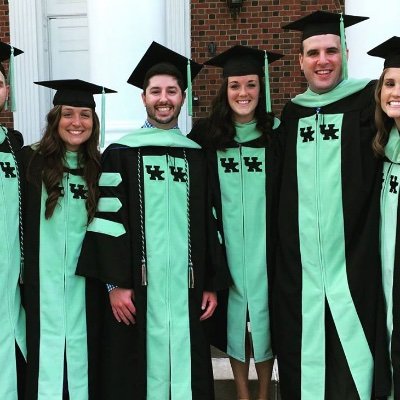DPT Alum Earns Northwestern Fellowship
Jul 13, 2021
By Ellee Sidebottom
CHS Contributor
“I can help people use their own body to get them well and then I can teach them the concepts they can continue to use to stay well, which is really unique.”
This is how UK alum Matt Fitch, PT, DPS, OCS, describes being a physical therapist.
Fitch’s passion for PT began when he was in high school after he broke his arm and needed to attend physical therapy as a part of his recovery. Fitch grew up loving sports and had a knack for helping people. After attending therapy and learning more about the field, he realized he could combine those interests into a career.
“I had to come to PT and (the therapist) was such an interesting guy that he really piqued my interest because it was kind of a formative time in my life — and I had this role model who was really good at their job,” Fitch said. “I liked helping people and the two seemed to mesh together pretty well for me.”
After undergrad at Morehead State University, Fitch attended UK’s Doctor of Physical Therapy Program and graduated in 2017. “You know, that’s really what drew me (to UK),” he said. “I knew that I was going to get a great education and a great foundation to start my career on.” In his second year, an opportunity arose to volunteer at the “Samaritan’s Touch” Physical Therapy Clinic, a pro-bono clinic housed across from UK HealthCare’s Samaritan Hospital. Fitch volunteered there often, which allowed him to develop and apply his skills as a provider. He eventually became the primary coordinator of the clinic.
“Serving as the primary coordinator was really informative to me as a student because I was able to learn the organizational side of health care, see clinicians work directly with patients, and learn more about population-based health care,” Fitch said.
Fitch, who now works at KORT Physical Therapy in Lexington, was recently accepted into Northwestern University’s prestigious and highly competitive Fellowship in Advanced Orthopedic Physical Therapy Practice, Research, and Education. Contained within Northwestern’s Department of Physical Therapy and Human Movement Sciences, the new post-professional fellowship program is designed for the licensed physical therapist seeking advanced training in orthopedic physical therapy. One of the overarching goals of the program is “improved management of the complex patient.” The 12-month program involves a series of educational classroom experiences and 150 hours of one-on-one mentored clinical practice. A strong emphasis is placed upon clinical reasoning, evidence-based practice, practice and theory in physical therapy education and a research experience.

Beginning Aug. 1, Fitch will start on Northwestern’s Chicago campus. The fellowship is mainly online, only requiring him to travel to campus a few times a year, which is one reason he chose to apply. Now he can stay in Kentucky, continue working at KORT Physical Therapy, and be with his family.
“It is a quite rigorous process to get into a Fellowship program,” he said. “It's basically a full year worth of getting shadowed one on one, and people are just basically ridiculing you for an entire year to make sure you get better, which is great — it's what I felt like I wanted and needed.”
UK's DPT program laid the foundation for Fitch’s career, and he has been able to build off that during his residency. He says he will continue to build off it during his fellowship at Northwestern as well, where he will continue to learn to be a better clinician and teacher.
“It’s a unique thing to be able to teach somebody,” he said. “And I always wanted to be in health care. (The UK program) totally surpassed everything I thought I was going to learn.”
After his fellowship, Fitch’s long-term goals include continuing to work at KORT while also helping his community and teaching the next generation of physical therapists.
“I always tell people, you’re going to get a great education going to UK,” he said. “From my experience, you are amongst some of the smartest people in the PT world that I have encountered on multiple different levels, from pediatrics to cardiovascular systems.
“These people are really transforming the industry on our research level,” he continued. “But you're also learning from people who have been doing it for such a long time that you know they have a great foundation of how to help you.”